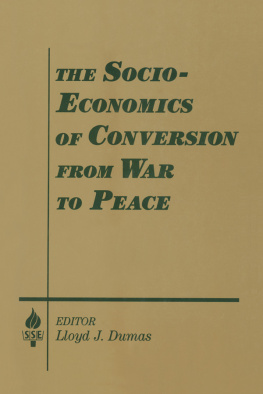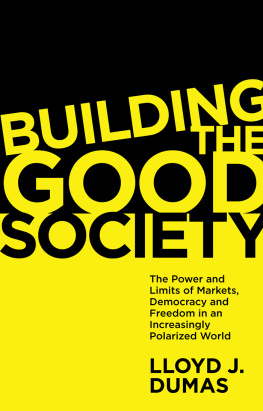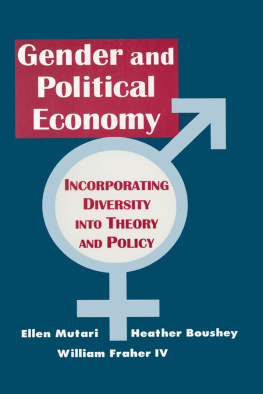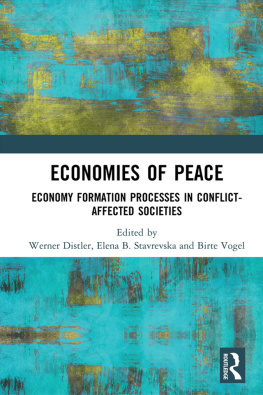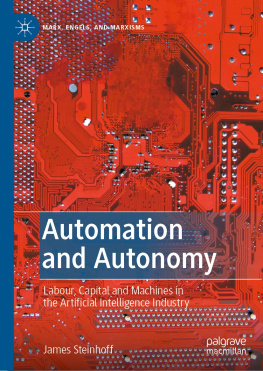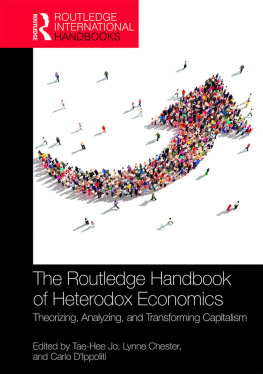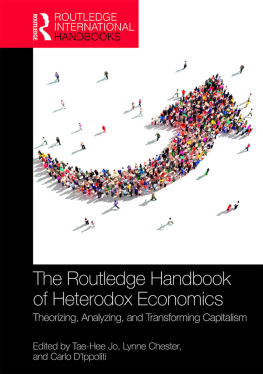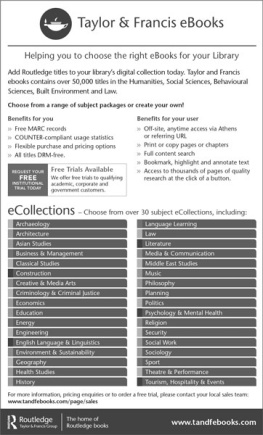Lloyd J. Dumas - The Socio-Economics of Conversion From War to Peace
Here you can read online Lloyd J. Dumas - The Socio-Economics of Conversion From War to Peace full text of the book (entire story) in english for free. Download pdf and epub, get meaning, cover and reviews about this ebook. City: London, year: 1995, publisher: Routledge, genre: Science. Description of the work, (preface) as well as reviews are available. Best literature library LitArk.com created for fans of good reading and offers a wide selection of genres:
Romance novel
Science fiction
Adventure
Detective
Science
History
Home and family
Prose
Art
Politics
Computer
Non-fiction
Religion
Business
Children
Humor
Choose a favorite category and find really read worthwhile books. Enjoy immersion in the world of imagination, feel the emotions of the characters or learn something new for yourself, make an fascinating discovery.
- Book:The Socio-Economics of Conversion From War to Peace
- Author:
- Publisher:Routledge
- Genre:
- Year:1995
- City:London
- Rating:3 / 5
- Favourites:Add to favourites
- Your mark:
- 60
- 1
- 2
- 3
- 4
- 5
The Socio-Economics of Conversion From War to Peace: summary, description and annotation
We offer to read an annotation, description, summary or preface (depends on what the author of the book "The Socio-Economics of Conversion From War to Peace" wrote himself). If you haven't found the necessary information about the book — write in the comments, we will try to find it.
Lloyd J. Dumas: author's other books
Who wrote The Socio-Economics of Conversion From War to Peace? Find out the surname, the name of the author of the book and a list of all author's works by series.
The Socio-Economics of Conversion From War to Peace — read online for free the complete book (whole text) full work
Below is the text of the book, divided by pages. System saving the place of the last page read, allows you to conveniently read the book "The Socio-Economics of Conversion From War to Peace" online for free, without having to search again every time where you left off. Put a bookmark, and you can go to the page where you finished reading at any time.
Font size:
Interval:
Bookmark:

NEW PERSPECTIVES ON SOCIO-ECONOMICS
Richard M. Coughlin, editor
TOWARD A NEW SYNTHESIS
Amitai Etzioni and Paul R. Lawrence, editors
THEORY AND EMPIRICAL FINDINGS
Sven-Erik Sjstrand, editor
FROM QUESNAY TO KEYNES
Pierre Guillet de Monthoux
Brian Forst, editor
A SOCIOECONOMIC APPROACH
Beat Brgenmeier, editor
Lloyd J. Dumas, editor

Lloyd J. Dumas

2 Park Square, Milton Park, Abingdon, Oxon OX14 4RN
711 Third Avenue, New York, NY 10017, USA
No responsibility is assumed by the publisher for any injury and/or damage to persons or property as a matter of products liability, negligence or otherwise, or from any use of operation of any methods, products, instructions or ideas contained in the material herein.
p. cm.
Includes index.
ISBN 1-56324-528-0. ISBN 1-56324-529-9 (pbk.)
1. Economic conversionUnited States.
2. Economic conversion.
I. Dumas, Lloyd J.
HC110.D4S53 1995
338.973dc20
94-48186
CIP
ISBN 13: 9781563245282 (hbk)
Lloyd J. Dumas
Dana L. Dunn
George Mehring
Domenick Bertelli
Elizabeth Mueller
Fred Rose
Gregory A. Bischak
James Raffel
Jonathan M. Feldman
Michael Oden
John E. Ullmann
November 1994
Font size:
Interval:
Bookmark:
Similar books «The Socio-Economics of Conversion From War to Peace»
Look at similar books to The Socio-Economics of Conversion From War to Peace. We have selected literature similar in name and meaning in the hope of providing readers with more options to find new, interesting, not yet read works.
Discussion, reviews of the book The Socio-Economics of Conversion From War to Peace and just readers' own opinions. Leave your comments, write what you think about the work, its meaning or the main characters. Specify what exactly you liked and what you didn't like, and why you think so.

